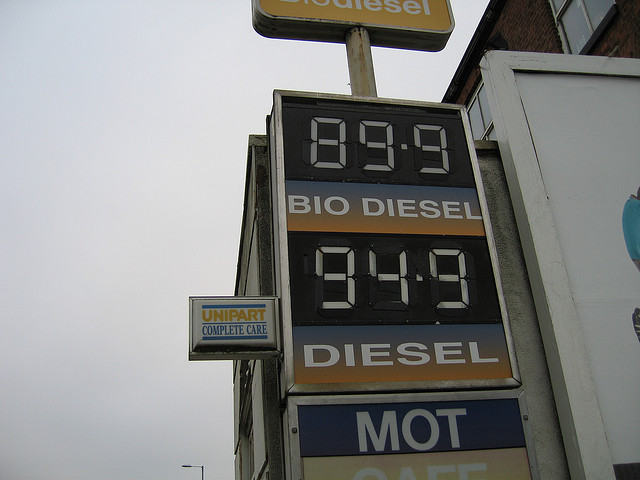If you pull into a Propel station in Washington or California (Propel being a chain of alternative fuel stations), you may notice a new offering: Soladiesel. It’s a name that hearkens back to the finest tradition of pseudo-sciencey terminology in ads for cigarettes and face creams (“Loaded with Coxyresin®!” “Lab-designed to satisfy your M-Zone™!”), but there’s kind of a logic to the name. It actually is a solar diesel! In the extremely indirect sense that algae needs the sun.
From NBC News:
Alternative gas station chain Propel is working with algal fuel creator Solazyme on a month-long experiment, selling algal-additive “Soladiesel” alongside Propel’s normal diesel. The special stuff is 20 percent algae oil, while the “original flavor” will have the usual additives. …
Algae has been proposed for years as an alternative to corn as a way to produce biofuels. Special algae are grown in bulk; when fed certain sugars, they produce combustible oils that can be used as fuel additives. The resulting fuel, biodiesel in this case, produces significantly less pollutants and, Solazyme claims, may in some ways actually perform better.
Solazyme’s “Soladiesel”™! Specially formulated for your car’s engine, etc., etc.!

binaryapeA grimy, run-of-the-mill biodiesel station in Europe.
Marketing speak aside, the ability to purchase algal fuel at a pump is significant. As The New York Times notes in an article today about fuels created from agricultural and household waste, we could be on the cusp of a broad transition into widely available biofuels — if they can be produced at a scale that could meet demand.
Officials at two companies that have built multimillion-dollar factories say they are very close to beginning large-scale, commercial production of these so-called cellulosic biofuels, and others are predicting success in the months to come. …
Just becoming the first company to produce commercial volumes of these alternative biofuels is no guarantee of commercial success. That depends on further optimizing production processes to get more gallons of fuel per ton of raw materials at lower operating costs. …
Many companies have produced biofuel successfully, but only in quantities characteristic of a factory that makes fine whisky or perhaps perfume. The trick is to get reliability up and costs down to a level that allows operation on a large scale.
NBC News raises the same point, highlighting one advantage for algal fuels.
There are serious questions regarding the ability to scale algae production to millions-of-barrels capacity, but companies like Shell and Exxon are investing billions in biofuels to find solutions to problems like these. One potential benefit: The oil-producing algae can be grown in salt and brackish water where other crops fail, and are more efficient than corn in their production per acre.
Those of you on the West Coast can get a glimpse of what a fully scaled-up biofuel industry could look like in the future — today! The same tedious chore of stopping to fill up, iced with a healthy smear of marketing blather.
You’ll forgive the rest of America for not being that jealous.



